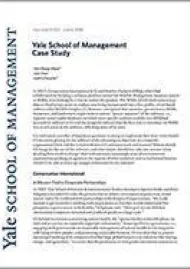Wallum in Ghana: Profits and Pitfalls

As CEO and founder of Wallum Enterprises, Marvin M. Garrett had overseen his firm's extraordinary growth from a minor player in the oil industry to a major petroleum extraction firm with a valuation in excess of $10 billion. Along the way, there were many gratifying achievements, but Garrett was more likely to cite his long tenure as chief executive as a point of pride than he was the company's growth or its profits. For Garrett, Wallum was a family-owned business and that meant an obligation to maintain steady growth, seek long-term value, and uphold high standards for transparency, integrity, and fairness. These principles had guided Wallum's management through many uncertain business deals over the company's 20-year history. As Garrett saw it, being family-owned was not only the right thing to do, but had given Wallum a unique position in the market.
Garrett had met recently with Finance Minister Kwabena Duffuor to discuss the possibility of Wallum purchasing a stake in a lease block in Ghana’s Jubilee oil field. Duffuor, an appointee of the newly elected President John Atta Mills, was determined to develop relationships with prospective bidders, especially with firms such as Wallum. Wallum’s expertise and principled approach to exploration was desirable to a government seeking to increase its international credibility. Bidding on the lease block was set to begin next week and Duffuor was hoping Wallum would send representation to Accra, Ghana’s capital city and the site of the Ghana National Petroleum Corporation (GNPC).
Despite the optimism of Ghana's officials and promises from exploration and extraction firms to work with the government to devote a portion of revenues toward Ghanaian society, significant questions remained unanswered and of serious concern to firms which were considering an ownership stake in the country’s offshore lease blocks. First and foremost, observers were keen to know whether Ghana would fall victim to the “resource curse,” suffering economically and politically despite its ownership of such a valuable natural resource.
Garrett had to decide whether making a bid in this case made sense as a long-term investment. On one hand, if Ghana avoided the resource curse, Wallum’s involvement might stand as a positive example of a foreign firm contributing to development in West Africa. The relatively small scale of Ghana’s oil find meant that Wallum might be able to build a significant presence across the country’s oil fields, helping it to develop the economies of scale along with government relationships necessary to extract significant profits.
On the other hand, Ghana’s government had so far failed to divulge the rules under which oil firms would operate. Major questions were still unanswered. It was not clear to what extent firms would be required to forfeit profits to the government or how the government planned to use those funds. Despite a tense but peaceful democratic process resulting in the election of John Atta Mills, there were significant concerns about the state of Ghana’s civil society institutions. Government intervention to in the sale of an adjacent lease block presented the unfortunate image of Ghana’s officials standing in the way of the foreign oil firms seeking to profit from their ownership stakes. It was far from certain that Ghana’s government had the rules and the restraint necessary to both regulate these firms and to effectively administer a share of their profits.